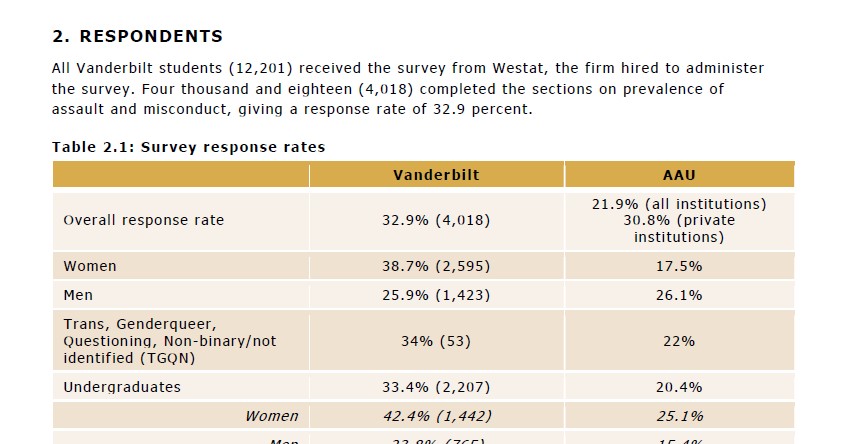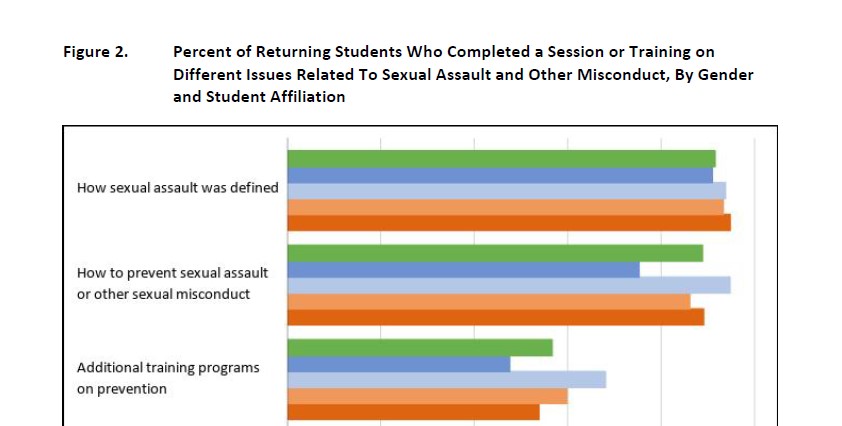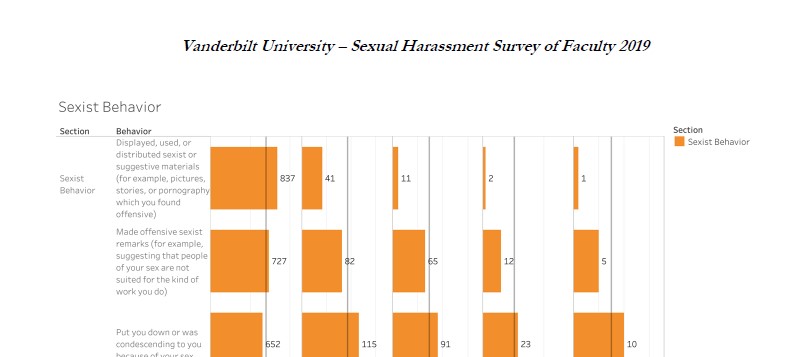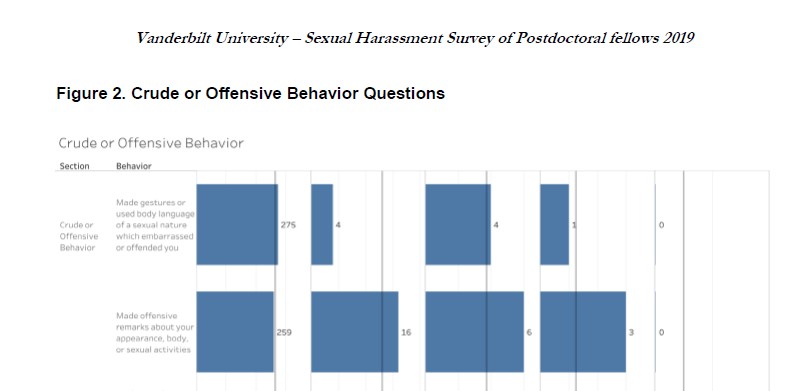Surveys on Sexual Assault and Misconduct – Public Data
VU Gender-Based and Sexual Misconduct Survey (2024)
Gender-based and sexual misconduct survey available for Vanderbilt community
Vanderbilt students, postdocs, faculty and staff have the opportunity to voice their experiences with gender-based and sexual misconduct on campus in a survey.
Vanderbilt University students, postdocs, faculty and staff have the opportunity to share their experiences with gender-based and sexual misconduct through a survey emailed to participants on Feb. 26, 2024.
The survey gathers information about experiences with interpersonal violence, including sexual assault, sexual misconduct, domestic violence, stalking, harassment and other forms of relationship violence. The survey asks about perceptions of social situations, experiences with interpersonal violence and awareness of reporting and support resources available at Vanderbilt.
All Vanderbilt community members are asked to complete this survey, whether or not they have had personal experience with gender-based and sexual misconduct.
Participants can complete the survey questions in approximately 10–15 minutes.
We would like to offer all students who complete the survey a free small coffee/espresso/tea drink as a token of appreciation for your time. To claim your drink, you will be asked to put your VUnetID into a separate VU portal. This portal is not connected to the survey in any way, and your answers to the survey will not be connected to your identity. Your free drink will appear on your GET account within five business days and can be claimed at Local Java in Alumni Hall with your mobile credential or physical Commodore Card (offer expires May 3, 2024). All students receiving a drink will be entered into a random drawing; 10 students will win a free set of AirPods.
About the Survey
Answers are confidential and protected.
Vanderbilt contracted with Rankin Climate LLC to conduct this survey. This ensures the objectivity and confidentiality of the information. Rankin Climate has been working with college campuses for more than 20 years and has conducted similar assessments on more than 230 college campuses nationwide. The Vanderbilt survey is based on the ARC3 survey, which is considered the gold standard by many experts and has been recommended as the best tool by the National Academies of Science, Engineering, and Medicine. This project is advised by Kevin Swartout, one of the founding members of the ARC3 and a leader at Rankin Climate. Data gathered will be confidential, private and anonymized. The data and analysis Vanderbilt will receive from Rankin will have no names or other identifiable information.
Campus environments matter.
We know from the research that thriving campus environments contribute directly to overall success for students, faculty, postdocs and staff. Harassment, bias or a lack of support can lead individuals to elect to leave the Vanderbilt community. The information collected through this survey will help us better understand how to create a campus environment in which every member is able to thrive.
Share your voice.
Ensuring inclusive and equitable campus experiences for all members of the community requires us to deeply listen and understand their experiences. You can help by sharing your stories and encouraging others to do the same by completing the survey, whatever your experience or lack of experience with gender-based and sexual misconduct.
Review the 2019 responses.
Students, postdocs and faculty were last surveyed about these topics in 2019. The 2024 survey will be the first time that Vanderbilt staff will be surveyed. Data from the 2019 surveys can be found here.
Several changes have been made on campus since the 2019 survey. Work that has been done at Vanderbilt includes but is not limited to:
—joining the AAU Advisory Board on Sexual Harassment and Gender Discrimination and the National Academies for Science, Engineering, and Medicine’s Action Collaborative on the prevention of sexual harassment in higher education as a founding member
—expanding the Title IX Office, which now includes a director, assistant director, informal resolution and supportive measures manager, two investigators and a training specialist for policy and prevention
—hiring more Project Safe Center staff
Track our progress.
Vanderbilt has implemented initiatives as a result of the 2015 and 2019 surveys.
Informed by the 2015 Campus Climate Survey, Vanderbilt University:
- Host Green Dot Bystander Intervention Training Institute on campus to train 20+ faculty and staff instructors to expand our bystander intervention training offerings
- Project Safe adds the One Love Foundation’s Escalation Workshop on dating violence awareness, prevention and intervention to Project Safe’s program offerings
- Begins requiring introductory sexual misconduct prevention training for incoming graduate and professional students
- Expands the staffing of the Project Safe Center by adding an additional prevention educator and victim resource specialist
- Title IX, VUPS and Project Safe collaborate to create an emergency guide on sexual assault that was added to SafeVU app
- The existing Provost’s Task Force on Sexual Assault (PTFSA) is renamed the Provost’s Sexual Misconduct Prevention Committee (PSMPC). The PSMPC reviews and recommends campus strategies for prevention of sexual misconduct and intimate partner violence; serves as a liaison to local campus units on these issues; and collaborates with student groups seeking to improve the campus climate regarding sexual misconduct and intimate partner violence.
- The PTFSA and Project Safe host a series of focus groups in Spring 2017 involving graduate and professional students to learn more about their sense of safety on campus and concerns around sexual harassment and assault
- The Project Safe Center introduce a dating violence prevention program, the Escalation Workshop, offered through the One Love Foundation, and develop programs, including Supporting a Survivor; the Language of Violence; Actionable Next Steps: Moving Beyond Awareness to the Work of Culture Change; Sexploitation: Sexting, Coercion, and Consent; Understanding Coercion; Survivor Self-Care; What is Rape Culture?; and Stalking: Know It, Name It, Stop It
- Project Safe begins offering Rooted in Resilience, a survivor support group
- The former Office of Equal opportunity, Affirmative Action and Disability Services (EAD) and Project Safe partner with the Faculty Senate to offer training for faculty on complying with mandatory reporting requirements and assisting students who have experienced sexual violence
- Project Safe and the Office of Student Accountability, Community Standards & Academic Integrity (SACSAI) train all Student Affairs staff on their mandatory reporting obligations and offer guidance in assisting students who have experienced sexual misconduct
- Project Safe, SACSAI and The Commons partner to offer a one-hour program, The Commons Addresses Sexual Violence, to all first-year students during their first week on campus addressing risk reduction, on-campus resources and bystander intervention. (This continues, as Vanderbilt Addresses Sexual Violence, and is offered to all new undergraduate students—incoming first-year students, international students and transfer students.)
- Feature sexual assault and stalking as scenarios in the CommonVU True Life program
- Incorporate Project Safe programming into the My Vanderbilt Experience and My Greek Experience program to encourage attendance and reach more students
- Offer an introduction to bystander intervention as a Vanderbilt Visions session for first-year students (approximately two-thirds of the 92 Visions groups select this program)
- The Title IX Working Group develops a one-page investigative process flow chart to help the community better understand the Sexual Misconduct Policy and the Title IX team’s procedures.
- Vanderbilt University is recognized with the Campus Prevention Network’s Prevention Excellence award
- Project Safe begins offering victim advocacy walk-in hours at satellite locations, including the Commons Center, the Law School, Owen and the Black Cultural Center
- Project Safe, Title IX, EOA and the former Office of Inclusive Excellence partner to create and offer a faculty workshop, Reporting and Responding to Disclosures of Sexual Misconduct
- Project Safe partners with Vanderbilt Student Government (particularly the Sexual Assault Awareness and Prevention subcommittee known as VSAAP) each year to host the It’s On Us Week of Action (bystander intervention focus)
- The Faculty Senate devotes an issue of their “Engage” newsletter to awareness and prevention, highlighting reporting obligations and support resources available through Project Safe and Title IX
- Title IX and Project Safe train academic advisers on the resources and services available to students (complainants and respondents)
- VUPS, Student Affairs and Title IX partner to promote the SafeVU app
- Vanderbilt Student Government passes resolution to add the Project Safe hotline to the back of student ID cards
- Project Safe begins offering trauma-informed training on supporting student survivors to Student Affairs, VUPS, Athletics staff and other community members likely to receive disclosures of reports
- Partners with Center for Teaching to create sample syllabus statements addressing faculty mandatory reporting obligations and available support resources
Informed by the findings of the 2019 Campus Climate Survey, Vanderbilt University:
- Release story with 2015 comparison and directions for 2019 findings: Vanderbilt climate surveys on sexual assault and misconduct show informed and engaged campus community, challenges remaining | Vanderbilt University
- Joins AAU Advisory Board on Sexual Harassment and Gender Discrimination AAU Expanding Fight Against Sexual Misconduct on Campus | Association of American Universities (AAU)
- Vanderbilt joins National Academies sexual harassment prevention collaborative as founding member | Vanderbilt University
- Hire more Project Safe Center staff
- Build out Title IX Office, which now includes director, assistant director (new), informal resolution and supportive measures manager (new), two investigators (one new), and training specialist for policy and prevention (new)
- Launch Gender Harassment Portal (no longer available) Vanderbilt University launches gender harassment portal as an effort to make resources more accessible to students – The Vanderbilt Hustler
- Institute online reporting system for reports of sexual misconduct and sex and gender harassment
- Title IX Reporting Link (for sexual misconduct reports)
- EOA Reporting link (for gender harassment reports)
- Project Safe increases educational programming designed to address online sexually harassing behaviors and sexual exploitation related to the nonconsensual taking and/or distribution of photos and videos
- Project Safe partners with the Office of LGBTQI Life to increase educational programming for LGBTQIA+ students on dating app safety
- Project Safe partners with community organization ASSERT Empowerment Self-Defense to bring trainings to campus
- Project Safe creates and offers bystander intervention for incivility and gender harassment prevention (available in person and in Oracle Learn)
- PSMPC reviews 2019 survey results and recommends incorporating restorative practices into university handling of sexual misconduct; Title IX staff participate in restorative practices training and create successful informal resolution process (see below)
- Title IX’s informal resolution process has been successful in nearly 90 percent of cases where parties elect to participate in informal resolution
- Continues to raise awareness and demonstrate commitment to addressing sexual misconduct by bringing high-profile speakers to campus, including Anita Hill, Ally Raisman, Terry Crews, Ashley Judd, Cyntoia Brown, Ashlee Haze and Marlee Liss
- Expand resources for graduate students and postdocs to address power differentials that may exist in the educational and training environment that contribute to risk of sexual harassment
- See NASEM Action Collaborative to End Sexual Harassment in Higher Education repository for Vanderbilt’s statements of work: Sexual Harassment Collaborative Repository | National Academies
- Altering Departmental Admissions Policies to Diffuse Dependent Relationships Between Graduate Students and Their Advisors
- Creating and Implementing an Informal Resolution Process for Sexual Misconduct Claims
- Surveying Faculty and Postdocs about Experiences with Sexual Harassment and Misconduct at the Institution
- Screening Faculty Job Candidates for a History of Discrimination or Harassment through Self-Reporting
- Title IX Office/Project Safe Collaboration – Addressing Reports of Sexual Misconduct Within a Registered Student Organization
- See NASEM Action Collaborative to End Sexual Harassment in Higher Education repository for Vanderbilt’s statements of work: Sexual Harassment Collaborative Repository | National Academies
- Title IX Office rewrites Sexual Misconduct and Intimate Partner Violence Policy to assure continued compliance with U.S. Department of Education’s implementation of 2020 regulations, which results in creation and implementation of Sexual Misconduct Policy and Formal Grievance Protocol. Title IX Office then creates and institutes a new process to conduct formal investigations, replacing former single investigator model with hearing model. Title IX Office identifies, retains and trains outside advisers for parties as required by new regulations
- Title IX Office identifies and retains outside hearing officers as required by new regulations and Vanderbilt’s policies
- Title IX Office identifies and retains outside appellate officers as required by new regulations and Vanderbilt’s policies
- Title IX creates the position of and hires a Training Specialist for Policy and Prevention to spearhead and create training programs for students, faculty and staff, as well as work with key campus partners to identify and develop target training opportunities, including development of workshops and tool kits to address sexual misconduct within programs, cohorts and RSOs
- Athletics continues training, hiring efforts Vanderbilt Athletics outlines progress made to address and prevent sexual assault and misconduct | Vanderbilt University
- Title IX trains all Athletics staff and student athletes annually
- Athletics designated staff member who acts as liaison to Title IX Office for ease of communication and reporting
- Launches You at VU campaign You at VU: How to report instances of sexual misconduct | Vanderbilt University
- Increase transparency of Title IX Office and process by participating in webinar for parents to discuss office procedures and policies
- Title IX trains all Residence Experience Staff annually on their reporting obligations as mandatory reporters and also participates in a report writing workshop with ResEx staff for these reports.
Learn more about Vanderbilt’s efforts and resources on the Title IX website. Comprehensive information about Vanderbilt’s sexual violence prevention and response, including information and recommendations to get involved in our work to combat gender-based and sexual misconduct is on the site.



